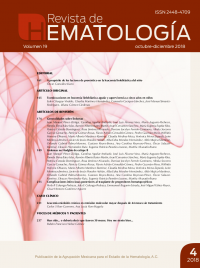Infectious complications after hematopoietic stem cell transplant.
Rev Hematol Mex. 2018 octubre-diciembre;19(4):215-230.
Perla R Colunga-Pedraza,1 Julia E Colunga-Pedraza,1 Emmanuel Bugarin-Estrada,1,2 José Miguel Yáñez-Reyes,1 César Homero Gutiérrez-Aguirre1
1 Servicio de Hematología, Hospital Universitario Dr. José Eleuterio González, Universidad Autónoma de Nuevo León, Monterrey, Nuevo León, México.
2 Escuela de Medicina y Ciencias de la Salud, Tecnológico de Monterrey, Monterrey, Nuevo León, México.
Resumen
El trasplante de células progenitoras hematopoyéticas (TCPH) es una opción terapéutica fundamental para pacientes con enfermedades hematológicas. Las infecciones constituyen causa importante de morbilidad en el paciente trasplantado, con tasas de mortalidad que varían desde 8% en trasplante autólogo hasta 20% en alogénico. Múltiples factores contribuyen al riesgo elevado de infecciones en el paciente trasplantado, como la edad, las comorbilidades, el régimen de acondicionamiento, la compatibilidad HLA, la administración de agentes inmunosupresores y el tipo de trasplante. Debido a la reconstitución hematopoyética e inmunológica que tiene lugar durante el trasplante, los pacientes estarán más propensos a adquirir determinados agentes infecciosos, entre bacterias, virus y organismos micóticos. Por ello, es de gran relevancia para el hematólogo conocer las causas infecciosas más frecuentes en este escenario para efectuar el abordaje preventivo, diagnóstico y terapéutico apropiado.
PALABRAS CLAVE: Trasplante de células progenitoras hematopoyéticas; trasplante autólogo; trasplante alogénico.
Abstract
The hematopoietic stem cell transplant (HSCT) is a therapeutic option for patients with hematologic malignancies and other non-malignant diseases. Infections are a major cause of morbidity in transplant patients, and are associated with high mortality rates, ranging from 8% in autologous HSCT to 20% in allogeneic HSCT. Multiple factors contribute to the increased risk of infectious diseases in patients receiving a transplant, including the age, comorbidities, conditioning scheme, HLA compatibility, the use of immunosuppressive drugs and the type of HSCT. Due to the hematopoietic and immune reconstitution taking place during the transplant, these patients are at an increased risk to acquire certain infectious agents, involving bacteria, virus and fungi. Therefore, it is important for the hematologist to know the most frequent infectious diseases in transplant patients to let proper preventive, diagnostic and therapeutic approaches.
KEYWORDS: Hematopoietic stem cell transplant; Autologous transplantation; Allogeneic transplantation.

